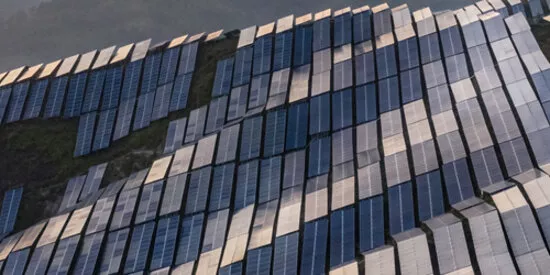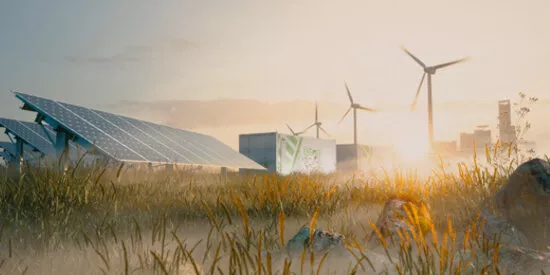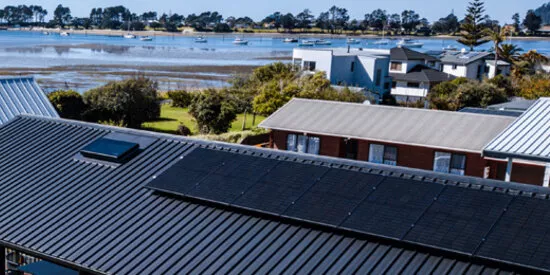
How Sustainable Trade Finance is driving Asia’s Energy Transition
Being amongst the pioneer on Sustainable Trade Finance, Societe Generale has developed several trade finance products to help support its clients in their transition. Shujue Cai, Head of Structured Trade and ESG Transaction Banking for Asia Pacific, shares her views on how sustainable trade finance solutions create positive impact to our clients, environment and the society.
The International Energy Agency estimates that to reach net zero carbon emission by 2050, electricity should account for almost 50% of total energy consumption, with 90% of electricity generation coming from renewables (solar photovoltaic and wind contributing almost 70%)1. This transition away from fossil fuel energy will require enormous investment in new capacity, grid modernisation and power storage, necessitating an estimated USD100 trillion of clean energy investment over the next three decades2.
There has been strong momentum in Asia as well. The combination of increasing consumer demand and the pressures to adhere to global climate guidelines contributing to the urgency of the energy transition, represents a huge potential in Asia for the development of both infrastructure and renewable energy projects.
Accordingly, there is a pronounced momentum on the policy front. Local regulators such as the Hong Kong’s Monetary Authority and the Singapore’s MAS central bank, as well as regional organisations, like ASEAN, have Financial Industry Taskforces working on guidelines and taxonomies to guide the classification of green activities. China is co-chairing with the EU of an international taskforce to develop a global ‘Common Ground’ taxonomy for green finance.
All these initiatives aim at fostering sustainable finance in the region, underscoring the importance of understanding the sustainable finance landscape and the options available to companies operating in Asia.
Climate finance must play a crucial role in achieving such a net-zero transition. The role of the financial sector in climate transition is key as mentioned in the Paris Agreement, in which parties agreed to make ‘finance flows consistent with a pathway towards low greenhouse gas emissions and climate-resilient development’ (UNFCCC, 2015). Financial institutions are recognized as influential actors for climate action through financing and investing but can play a strong role through trade finance as well.
With a significant number of flows, trade finance can bring an outsize impact on CO2 emission reduction in multiple sectors worldwide. They can provide guarantees and letter of credits essential to the trade in climate-related technologies and projects and even help making low-carbon technologies available to a broader range of countries.
Then, trade finance can support ESG shift by supporting companies willing to shift their value chain to a more sustainable one (suppliers with enhanced ESG maturity, less CO2 emitting transportation, responsible goods and commodities…).
Trade finance also represents a greater potential to deliver a significant improvement in the sustainability performance of corporate clients and their suppliers and can help ensure that goods and services are produced in the most carbon efficient location.
Given the market trends on the ESG debt market, and the growing demand for sustainable financial services, McKinsey estimates that by 2025, sustainable trade finance revenue pools will reach $16 billion to $20 billion, growing at an annual rate of approximately 15 to 20 percent.
Being amongst the pioneer on Sustainable Trade Finance, Societe Generale has developed several trade finance products to help support its clients in their transition. In the absence of mature and recognized market standard on sustainable trade, the bank has built its sustainable trade finance offer with existing standards as backbone (Green/Social loan principles, Green bond principles, the EU Green taxonomy, the Sustainability-linked loans principles…). The bank is also closely following the current development around ICC Standards for Sustainable Trade and is part of the pilot for the application of the Wave 1 framework for transactions in the textiles sector that has just been announced by ICC during the COP27 climate summit.
Societe Generale offers green trade finance instruments such as letters of credit and bank guarantees securing underlying projects which have a clear positive contribution to the environment. Our internal framework categorises eligible green projects as belonging to activities such as: renewable energy, clean transportation, sustainable water & wastewater management, waste management, circular economy, green buildings. The same approach has been taken on social trade finance with a focus on targeted population in sectors such as health, education, affordable housing, affordable basic infrastructure.
In addition to classic sustainability-linked bonds and loans, Societe Generale also offers sustainability-linked trade facilities to support its clients in their ESG transition by incentivising clients’ achievements of ambitious, predetermined sustainability performance targets (SPT), such as a certain % of reduction of carbon emissions, increase in circular economy, reduction of accident frequency rate or increase of diversity within management. The clients’ Corporate Social Responsibility (CSR) rating can be used as a complementary indicator.
Societe Generale’s green trade finance track record includes issuing its first green trade finance guarantee facility as early as in 2019, worth EUR230 million, for wind turbine suppliers Siemens Gamesa Renewable Energy (SGRE) in supplying wind power solutions across the world and match its commitment to the Sustainable Development Goals.
In Asia, Societe Generale Seoul has just issued a batch six green guarantees for Hyosung Heavy Industries to support a wind energy storage project.
These are just some of the milestones Societe Generale has achieved in green and sustainability-linked trade finance, and we look forward to working with our clients to continue to address environmental and social challenges, so as to create the better future that the next generations deserve.
1. IEA (2021), Net Zero by 2050 – Analysis, IEA, Paris, accessed 26 August 2022, https://www.iea.org/reports/net-zero-by-2050
2. https://www.forbes.com/sites/davidcarlin/2021/06/02/the-ieas-net-zero-climate-pathway-is-a-100-trillion-investment-opportunity/?sh=3f2d51805597





